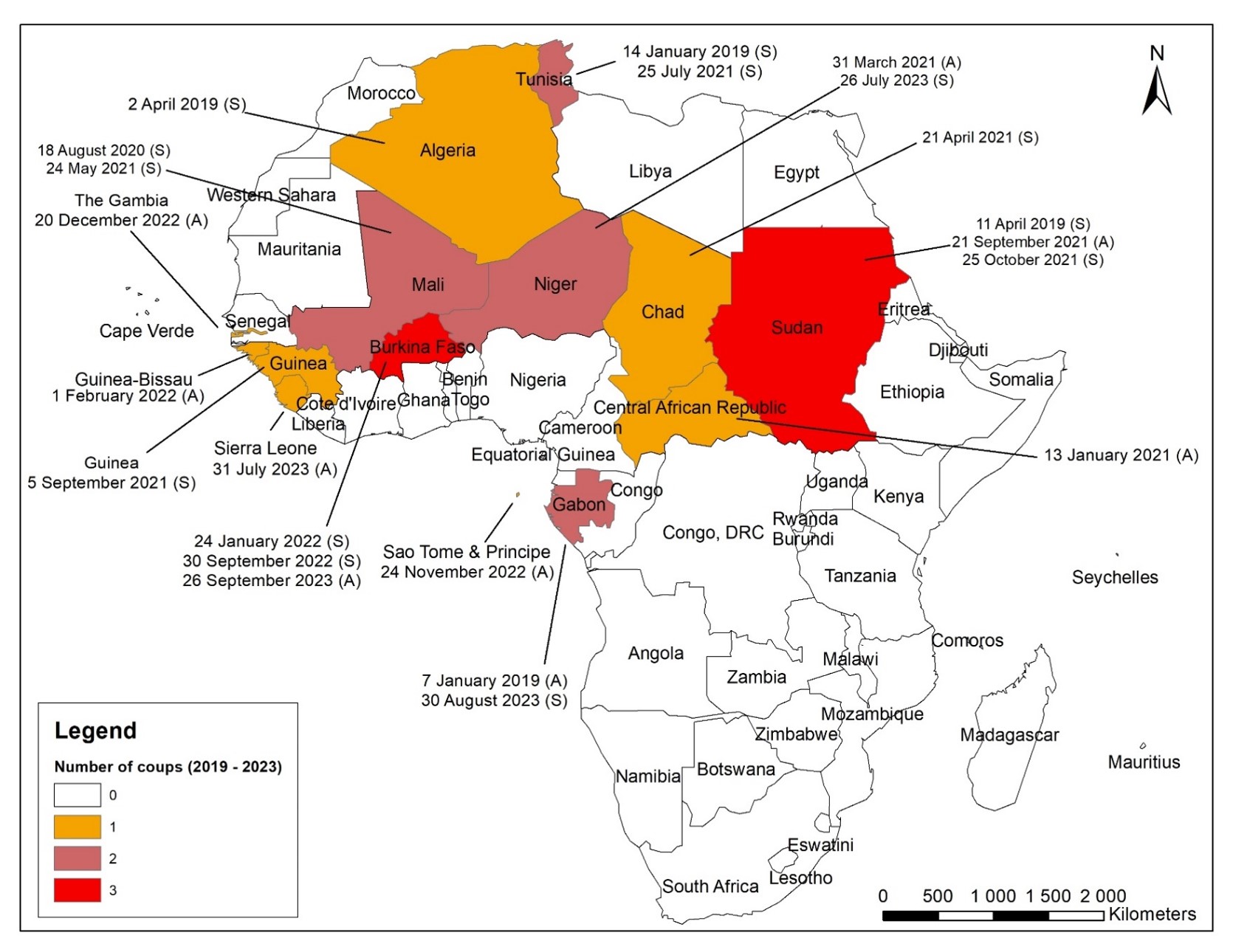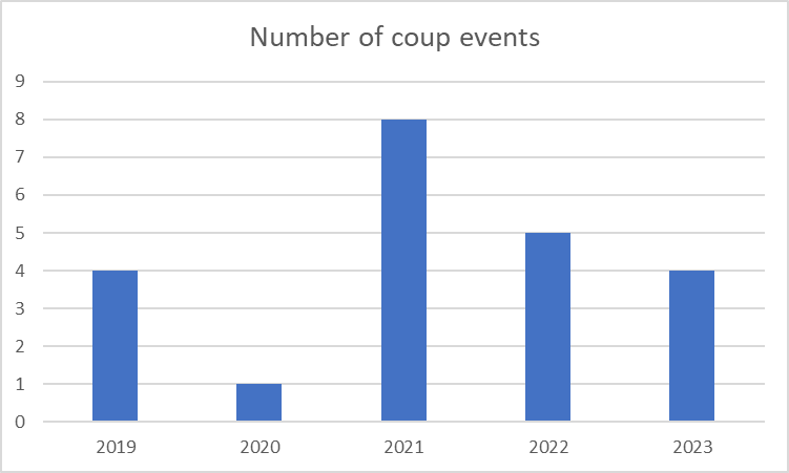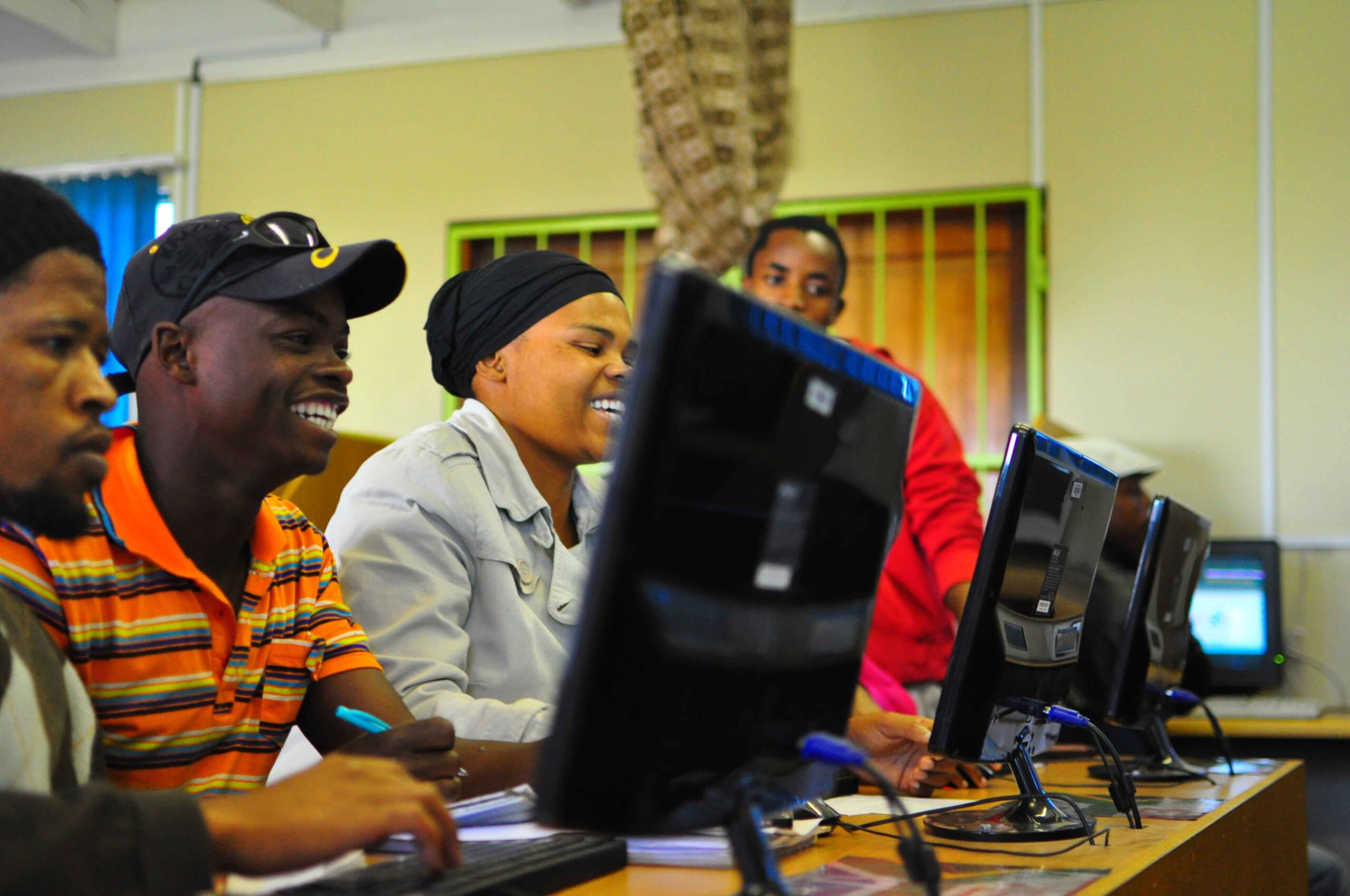Africa has been among the world’s most coup-prone regions for the past 60 years (Chin and Kirkpatrick, 2023). Coups are defined by Powell and Clayton (2011) as “illegal and overt attempts to unseat the sitting executive branch by the military or other elites within the state apparatus. Events such as coups and regime changes nearly always have the goal of altering a nation’s fundamental institutional structure. A coup occurs when a faction, usually from the military or the political elite, tries to seize control using violent and illegal methods (Bennet et al., 2021). This spatial Insights focuses on coups from 2019 to 2023 because events within this timeframe are more likely to have direct implications for current political dynamics, regional stability and international relations.

Figure 1 shows the geographic distribution of coup attempts in Africa, 2019 – 2023. S in parentheses denotes a successful coup and A denotes a failed coup attempt. There were twenty-two coups, thirteen of which were successful and nine of which were attempts. Source: Powell and Clayton (2011); Olewole (2023), adapted by the HSRC
Most coups force the outgoing regime leader to step down, while others stop the presumed regime leader’s (or the legal successor’s) arrival after the outgoing leader leaves (Chin et al., 2021). Successes are defined as instances where the offenders (or their operatives) hold sway over authority for a minimum of seven days (Powell and Clayton, 2011). When a coup is successful, the ruling party is overthrown (“leader change rule”), and either the postcoup leader remains in office for at least seven days (“one-week rule”), or the coup results in a change of regime (Chin et al., 2021). Figure 2 illustrates the fluctuating number of coup events in Africa from 2019 to 2023. There was a notable increase in 2021 with eight recorded coup events, compared to the relatively lower numbers in surrounding years. The reasons for this increase should be investigated to inform early warning systems. The number of coups were lowest in 2020 and this can be ascribed to the lock down strategies of COVID-19 which forced people to remain indoors.

Figure 2: Number of coups by year (2019 – 2023)
The high number of coup attempts and successful coups indicates a level of political instability in parts of the continent during this period. The involvement of the military in many of these coups suggests a significant role played by armed forces in African politics. The frequency of coups may reflect underlying governance issues such as corruption and lack of accountability.
Moeti, T.J., Weir-Smith, G. & Sekhejane, P. (2024) Political turmoil in Africa: examining coups from 2019 to 2023. Spatial Insights: Edition 11. Pretoria: eResearch Knowledge Centre, Human Sciences Research Council. DOI: http://hdl.handle.net/20.500.11910/23226
References:
Bennett, D.L., Bjørnskov, C. and Gohmann, S.F. (2021). Coups, regime transitions, and institutional consequences. Journal of Comparative Economics, 49(2), 627 – 643.
Chin, J.J., Carter, D.B. and Wright, J.G. (2021). The varieties of Coups D’état: Introducing the Colpus dataset. International Studies Quarterly, 65(4), 1040 – 1051.
Chin, J.J. and Kirkpatrick, J. (2023). African coups in the COVID-19 era: A current history. Frontiers in Political Science, 5, 1077945.
Cline Center for Advanced Social Research, Coup d’État Project, Available: https://clinecenter.illinois.edu/project/research-themes/democracy-and-development/coup-detat-project
Olewole, A. (2023). A timeline of coups in Africa over three years. Business Insider Africa. Available: https://africa.businessinsider.com/local/leaders/a-timeline-of-coups-in-africa-over-three-years/hqclrgv
Powell, J and Clayton, T. (2011). Global Instances of Coups from 1950-Present. Journal of Peace Research, 48(2), 249 – 259.
For more information, contact:
Thabiso Moeti (tmoeti@hsrc.ac.za) or Gina Weir-Smith (gweir-smith@hsrc.ac.za


